#@spacex
Explore tagged Tumblr posts
Text
The Dragon and his Angels were no match for Christ Armies of Heaven (Rev...
0 notes
Text
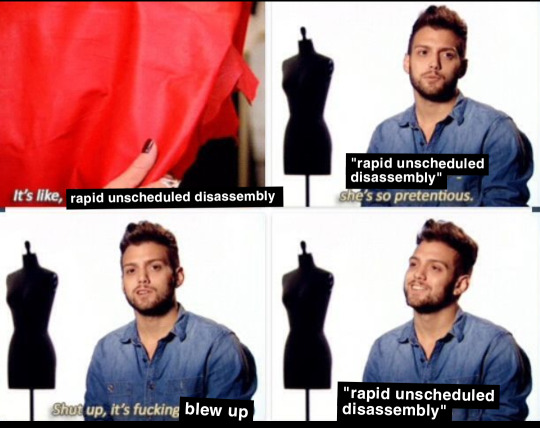
this is maybe the funniest thing to happen, ever. thank you spacex for once again pushing the boundaries of trashy scifi
27K notes
·
View notes
Text
As the conspiracy reaches its finale, the Void Hunter joins the fight.
Uncover the Conspiracy in Zenless Zone Zero's All-New Version "A Storm of Falling Stars", S-Rank Agent Hoshimi Miyabi is here! With S-Rank Agent Asaba Harumasa Limited-Time Giveaway! Pre-register to obtain additional rewards.
697 notes
·
View notes
Text
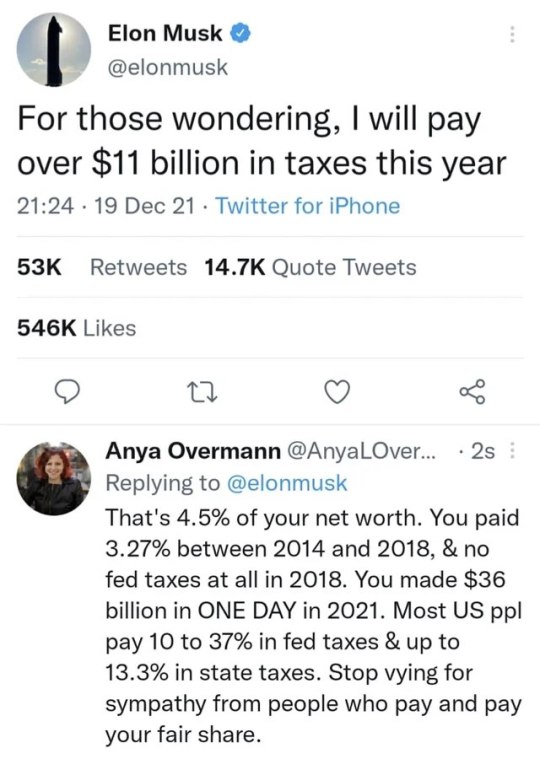
Elon Musk wants your sympathy because he had to pay a whopping 4.5% of his net worth in taxes
#Elon Musk wants your sympathy because he had to pay a whopping 4.5% of his net worth in taxes#elon musk#anti elon musk#fuck elon musk#fuck elongated muskrat#boycott elon musk#elongated muskrat#elon twitter#elongated man#elon mask#elon musty#elonmusk#musk#ausgov#politas#auspol#tasgov#taspol#australia#fuck neoliberals#neoliberal capitalism#anthony albanese#albanese government#teslamodely#teslamotors#teslacars#tesla#x#twitter#spacex
2K notes
·
View notes
Text

602 notes
·
View notes
Text

#cats on synthesizers in space#catsonsynthesizersinspace#cosis#cat#cats#synth#synths#synthesizer#synthesizers#space#cosmos#astronomy#scifi#nasa#spacex#caturday#cute#epic#funny#lolz#catsofinstagram#cats of tumblr#moog#moog voyager
1K notes
·
View notes
Text
so as it turns out spacex has the safety standards of an edwardian paper mill
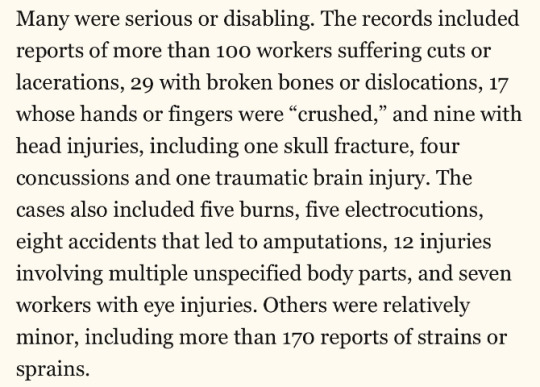
its kind of like. astonishingly bad.

musk is a manchild which is in and of itself not particularly conducive to safety culture but he also believes he's saving humanity from a dying earth which absolves him and spacex from any wrongdoing because those people are just sacrifices to a noble cause
6K notes
·
View notes
Text
GREAT WORK MISTER MUSK!

Yeah you don't need a flame diverter. Fuck that shit. Oh, for anyone that doesn't know what the super wise Elon Musk is talking about here when you have a MASSIVE rocket shooting out so much fire that it lifts itself into space that energy needs to go somewhere.
Here's a good demonstration:
youtube
Anyway, Elon is smart! He bought a degree in engineering or something because it's more efficient than actually going to college and learning things!
So he knows he doesn't need that shit.
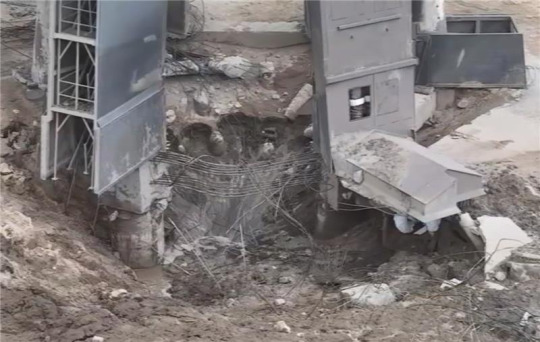
Oh.
Okay so there was a teeeeeny little bit of damage. That doesn't look too bad. Wait are those stairs on the left? They are. Okay so there's a kinda big crater.
Wait.
Where did two stories worth of stuff go?
Well, here's a video of shit flying up and almost destroying the rocket, watch from about +0.06 to +0.09 to see enormous concrete chunks making it halfway up the booster.
Also it was raining concrete nearby. So uh. That's cool.
Great job Elon. Amazing work.
9K notes
·
View notes
Text
I had to kill Elon Musk so I rampaged through what I think was a SpaceX building chasing him floor after floor until I got him. The whole thing felt like playing DOOM.
1K notes
·
View notes
Text


SpaceX's Super Heavy Booster Catch (x)
#super heavy#rocket booster#spacex#rocket launch#space#astrophotography#astronomy#stars#starship#mechazilla
435 notes
·
View notes
Text
The literally only impressive thing about SpaceX Starship test is that it shows how incredibly dumb the audience is at this point.

People keep comparing Starship to SaturnV, because tentatively, if it ever became a space worthy vessel and orbital delivery vehicle (it's not); it'd be the largest and most powerful one in history, with SaturnV its only near peer (sorry, N-1, you really didn't qualify).
And the first "integration test vehicle" (read: the actually whole complete thing, that's literally the point of that kind of test; it's meant to be all the pieces, already tested and proven on their own, finally assembled into the final thing to make sure everything plays nice when together)
So lets see how did Saturn family development go in comparison? How many "integration test vehicles" did the Saturn project obliterate in the process?
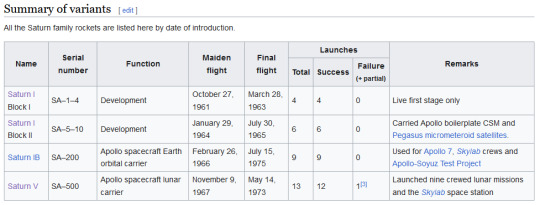
ZERO. They blew up ZERO Saturn first stages, ZERO Saturn second stages, and ZERO Saturn payloads.

It's not fucking normal to blow up rockets this size and complexity, because they're expensive and dangerous! You build SMALLER, SIMPLER prototypes, you test those, you do all the "risky" tests on your separate parts of the system, and test the integration at less ambitious scales and stress levels. That's how you do rocket science. Iteratively, yes! But the iterations must make sense!
And let me stress
They got Saturn to moon and back in the SIXTIES, when simulation was in diapers (partially, literally invented within projects like the Saturn series).
SpaceX exists at a time where they can (and should) do 90% of the raw, grueling development with lot of painful failures in digital simulations, or tests where you build a small, simple thing and enhance the simulation based on what you learned there.
And the worst of it all is that another thing that Elongated Muskrat has at this disposal is all of the Saturn research. It's been DONE.
Saturn and other projects paved the worst of this goddamn slog. They did all the dirty, awful work already. They literally gave us the textbooks that you study from if you actually get a science degree (Elon does not have one).
And again, the most embarrassing thing isn't Musk and his poor, toxic, overworked circus that's SpaceX. The most embarrassing thing is the "space science enthusiast" crowd that's cheering on this launch as some sort of tentative success.
The king is fucking ass goddamn naked, and you all yes-men are an embarrassment to this doomed goddamn species. You're not supporting the effort to give Humanity a "chance at survival", you're hooting and hollering around a basementman dumpster fire that's literally immolating what's left of the scraps of natural and human resources we have left.
5K notes
·
View notes
Text
Elon Musk just got fact checked by his dad after denying existence of his family’s emerald mine
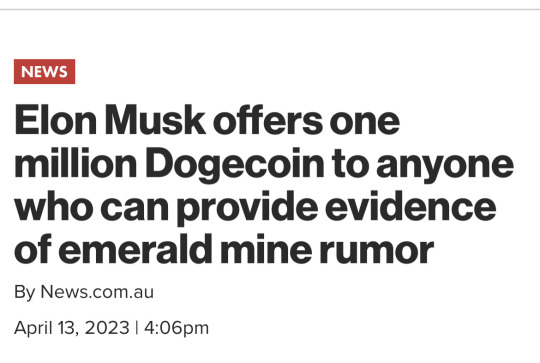

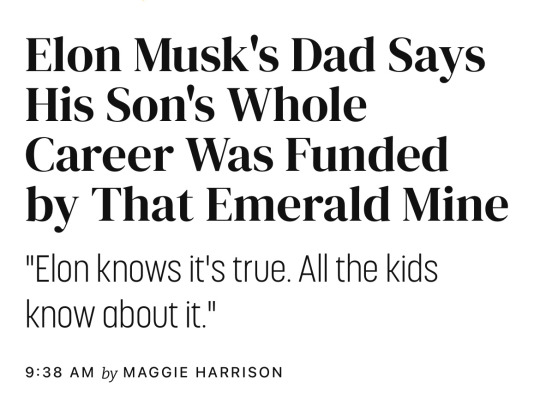
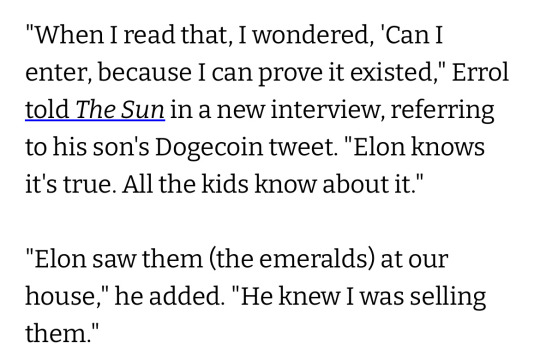
5K notes
·
View notes
Text
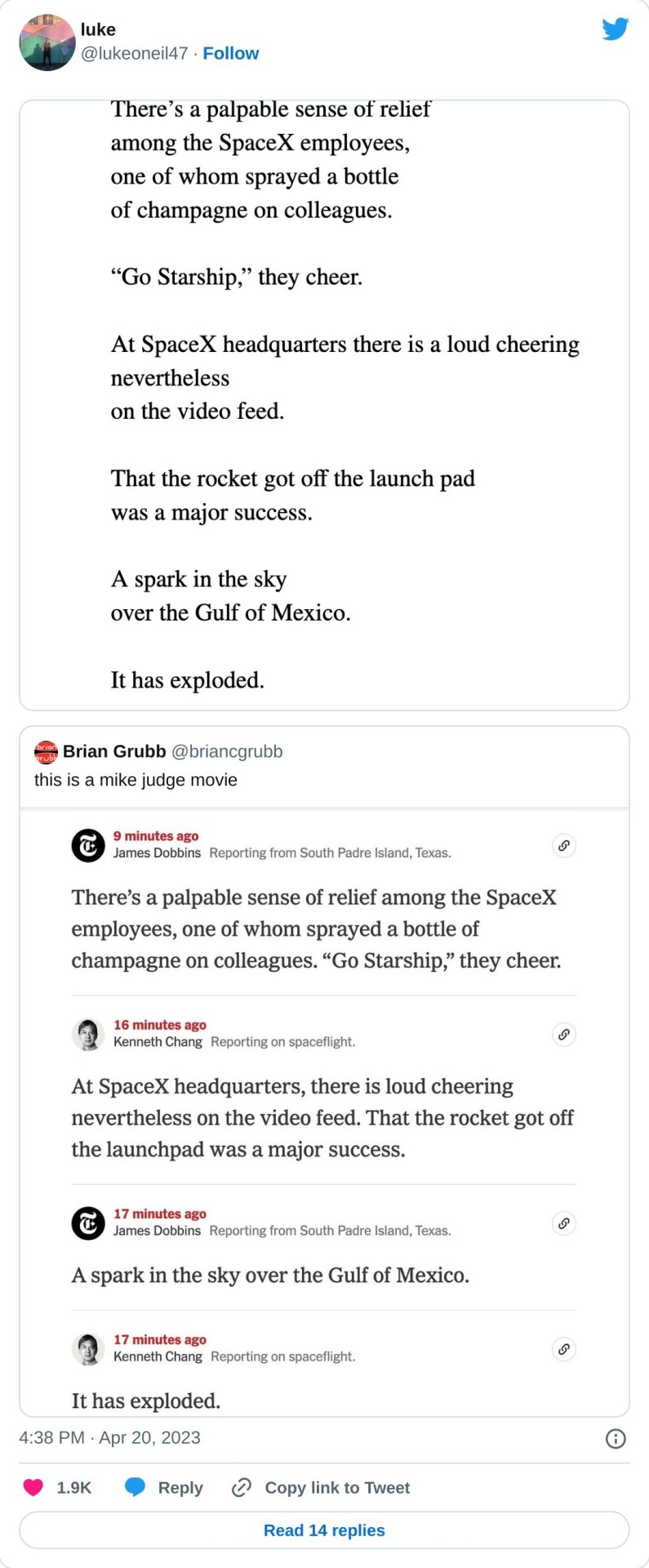

4K notes
·
View notes
Text
Kelly and Zach Weinersmith’s “A City On Mars”
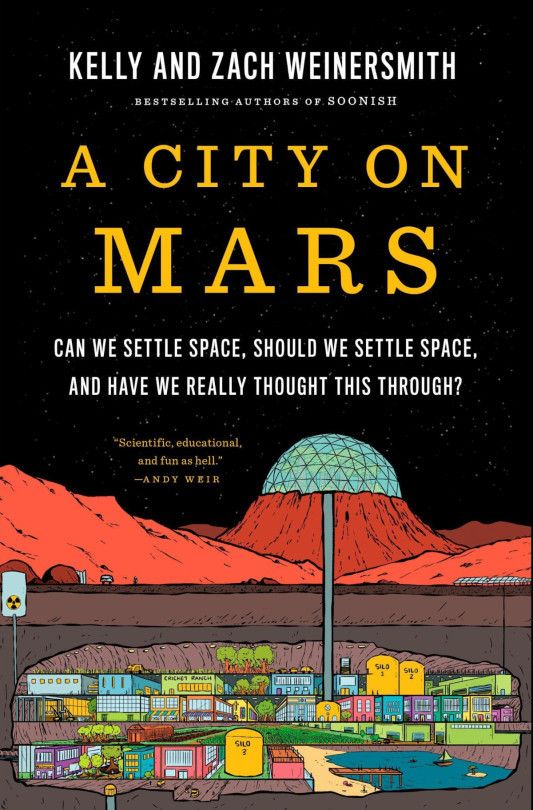
In A City On Mars, biologist Kelly Weinersmith and cartoonist Zach Weinersmith set out to investigate the governance challenges of the impending space settlements they were told were just over the horizon. Instead, they discovered that humans aren't going to be settling space for a very long time, and so they wrote a book about that instead:
https://www.acityonmars.com/
The Weinersmiths make the (convincing) case that ever aspect of space settlement is vastly beyond our current or reasonably foreseeable technical capability. What's more, every argument in favor of pursuing space settlement is errant nonsense. And finally: all the energy we are putting into space settlement actually holds back real space science, which offers numerous benefits to our species and planet (and is just darned cool).
Every place we might settle in space – giant rotating rings, the Moon, Mars – is vastly more hostile than Earth. Not just more hostile than Earth as it stands today – the most degraded, climate-wracked, nuke-blasted Earth you can imagine is a paradise of habitability compared to anything else. Mars is covered in poison and the sky disappears under planet-sized storms that go on and on. The Moon is covered in black-lung-causing, razor-sharp, electrostatically charged dust. Everything is radioactive. There's virtually no water. There are temperature swings of hundreds of degrees every couple of hours or weeks. You're completely out of range of resupply, emergency help, or, you know, air.
There's Helium 3 on the Moon, but not much of it, and there is no universe in which is it cheaper to mine for Helium 3 on the Moon than it is to mine for it on Earth. That's generally true of anything we might bring back from space, up to and including continent-sized chunks of asteroid platinum.
Going to space doesn't end war. The countries that have gone to space are among the most militarily belligerent in human history. The people who've been to space have come back perfectly prepared to wage war.
Going to space won't save us from the climate emergency. The unimaginably vast trove of material and the energy and advanced technology needed to lift it off Earth and get it to Mars is orders of magnitude more material and energy than we would need to resolve the actual climate emergency here.
We aren't anywhere near being a "multiplanetary species." The number of humans you need in a colony to establish a new population is hard to estimate, but it's very large. Larger than we can foreseeably establish on the Moon, on Mars, or on a space-station. But even if we could establish such a colony, there's little evidence that it could sustain itself – not only are we a very, very long way off from such a population being able to satisfy its material needs off-planet, but we have little reason to believe that children could gestate, be born, and grow to adulthood off-planet.
To top it all off, there's space law – the inciting subject matter for this excellent book. There's a lot of space law, and while there are some areas of ambiguity, the claims of would-be space entrepreneurs about how their plans are permissible under the settled parts of space law don't hold up. But those claims are robust compared to claims that space law will simply sublimate into its constituent molecules when exposed to the reality of space travel, space settlement, and (most importantly) space extraction.
Space law doesn't exist in a vacuum (rimshot). It is parallel to – and shares history with – laws regarding Antarctica, the ocean's surface, and the ocean's floor. These laws relate to territories that are both vastly easier to access and far more densely populated by valuable natural resources. The fact that they remain operative in the face of economic imperatives demands that space settlement advocates offer a more convincing account than "money talks, bullshit walks, space law is toast the minute we land on a $14 quadrillion platinum asteroid."
The Weinersmiths have such an account in defense of space law: namely, that space law, and its terrestrial analogs, constitute a durable means of resolving conflicts that would otherwise give rise to outcomes that are far worse for science, entrepreneurship, human thriving or nation-building than the impediments these laws represent.
What's more, space law is enforceable. Not only would any space settlement be terribly, urgently dependent on support from Earth for the long-foreseeable future, but every asteroid miner, Lunar He3 exporter and Martian potato-farmer hoping to monetize their products would have an enforcement nexus with a terrestrial nation and thus the courts of that nation.
But the Weinersmiths aren't anti-space. They aren't even anti-space-settlement. Rather, they argue that the path to space-based scientific breakthroughs, exploration of our solar system, and a deeper understanding of our moral standing in a vast universe cannot start with space settlements.
Landing people on the Moon or Mars any time soon is a stunt – a very, very expensive stunt. These boondoggles aren't just terribly risky (though they are – people who attempt space settlement are very likely to die horribly and after not very long), they come with price-tags that would pay for meaningful space science. For the price of a crewed return trip to Mars, you could put multiple robots onto every significant object in our solar system, and pilot an appreciable fleet of these robot explorers back to Earth with samples.
For the cost of a tiny, fraught, lethal Moon-base, we could create hundreds of experiments in creating efficient, long-term, closed biospheres for human life.
That's the crux of the Weinersmiths' argument: if you want to establish space settlements, you need to do a bunch of other stuff first, like figure out life-support, learn more about our celestial neighbors, and vastly improve our robotics. If you want to create stable space-settlements, you'll need to create robust governance systems – space law that you can count on, rather than space law that you plan on shoving out the airlock. If you want humans to reproduce in space – a necessary precondition for a space settlement that lasts more than a single human lifespan – then we need to do things like breed multiple generations of rodents and other animals, on space stations.
Space is amazing. Space science is amazing. Crewed scientific space missions are amazing. But space isn't amazing because it offers a "Plan B" for an Earth that is imperiled by humanity's recklessness. Space isn't amazing because it offers unparalleled material wealth, or unlimited energy, or a chance to live without laws or governance. It's not amazing because it will end war by mixing the sensawunda of the "Pale Blue Dot" with the lebensraum of an infinite universe.
A science-driven approach to space offers many dividends for our species and planet. If we can figure out how to extract resources as dispersed as Lunar He3 or asteroid ice, we'll have solved problems like extracting tons of gold from the ocean or conflict minerals from landfill sites, these being several orders of magnitude more resource-dense than space. If we can figure out how to create self-sustaining terraria for large human populations in the radiation-, heat- and cold-blasted environs of space, we will have learned vital things about our own planet's ecosystems. If we can build the robots that are necessary for supporting a space society, we will have learned how to build robots that take up the most dangerous and unpleasant tasks that human workers perform on Earth today.
In other words, it's not just that we should solve Earth's problems before attempting space settlement – it's that we can't settle space until we figure out the solutions to Earth's problems. Earth's problems are far simpler than the problems of space settlement.
As I read the Weinersmiths' critique of space settlement, I kept thinking of the pointless AI debates I keep getting dragged into. Arguments for space settlement that turn on existential risks (like humanity being wiped out by comets, sunspots, nuclear armageddon or climate collapse) sound an awful lot like the arguments about "AI safety" – the "risk" that the plausible sentence generator is on the verge of becoming conscious and turning us all into paperclips.
Both arguments are part of a sales-pitch for investment in commercial ventures that have no plausible commercial case, but whose backers are hoping to get rich anyway, and are (often) sincerely besotted with their own fantasies:
https://locusmag.com/2023/12/commentary-cory-doctorow-what-kind-of-bubble-is-ai/
Both AI and space settlement pass over the real risks, such as the climate consequences of their deployment, or the labor conditions associated with their production. After all, when you're heading off existential risk, you don't stop to worry about some carbon emissions or wage theft.
And critically, both ignore the useful (but resolutely noncommercial) ways that AI or space science can benefit our species. AI radiology analysis might be useful as an adjunct to human radiological analysis, but that is more expensive, not less. Space science might help us learn to use our materials more efficiently on Earth, and that will come long before anyone makes rendezvous with a $14 quadrillion platinum asteroid.
There are beneficial uses for LLMs. When the Human Rights Data Analysis Group uses an LLM to help the Innocence Project New Orleans extract and categorize officer information from wrongful conviction records, they are doing something valuable and important:
https://hrdag.org/tech-notes/large-language-models-IPNO.html
It's socially important work, a form of automation that is an unalloyed good, but you won't hear about it from LLM advocates. No one is gonna get rich on improving the efficiency of overturning wrongful convictions with natural language processing. You can't inflate a stock bubble with the Innocence Project.
By the same token, learning about improving gestational health by breeding multigenerational mouse families in geosynchronous orbit is no way to get a billionaire tech baron to commit $250 billion to space science. But that's not an argument against emphasizing real science that really benefits our whole species. It's an argument for taking away capital allocation authority from tech billionaires.
I'm a science fiction writer. I love stories about space. But I can distinguish fantasy from reality and thought experiments from suggestions. Kim Stanley Robinson's 2015 novel Aurora – about failed space settlement – is every bit as fascinating and inspirational as "golden age" sf:
https://memex.craphound.com/2015/11/02/kim-stanley-robinsons-aurora-space-is-bigger-than-you-think/
But still, it inspired howls of outrage from would-be space colonists. So much so that Stan wrote a brilliant essay explaining what we were all missing about space settlement, which I published:
https://boingboing.net/2015/11/16/our-generation-ships-will-sink.html
With City on Mars, the Weinersmiths aren't making the case for giving up on space, nor are they trying to strip space of its romance and excitement. They're trying to get us to focus on the beneficial, exciting, serious space science we can do right now, not just because it's attainable and useful – but because it is a necessary precondition for any actual space settlement in the distant future.

If you'd like an essay-formatted version of this post to read or share, here's a link to it on pluralistic.net, my surveillance-free, ad-free, tracker-free blog:
https://pluralistic.net/2024/01/09/astrobezzle/#send-robots-instead
#pluralistic#books#reviews#space#bezzles#mars#spacex#robots#science#space science#space travel#space settlement#space colonization
1K notes
·
View notes
Text

#cats on synthesizers in space#catsonsynthesizersinspace#cosis#cat#cats#synth#synths#synthesizer#synthesizers#space#cosmos#astronomy#scifi#nasa#spacex#caturday#cute#epic#funny#lolz#catsofinstagram#cats of tumblr#alien#aliens#keytar#chestburster
803 notes
·
View notes
Text
It's being estimated that the spaceX launch, lacking the regulation and oversight of NASA launches, might have wiped out as much as 4% of the population of the federally protected Piping Plovers who's nesting site was within the effected area of the launch blast.
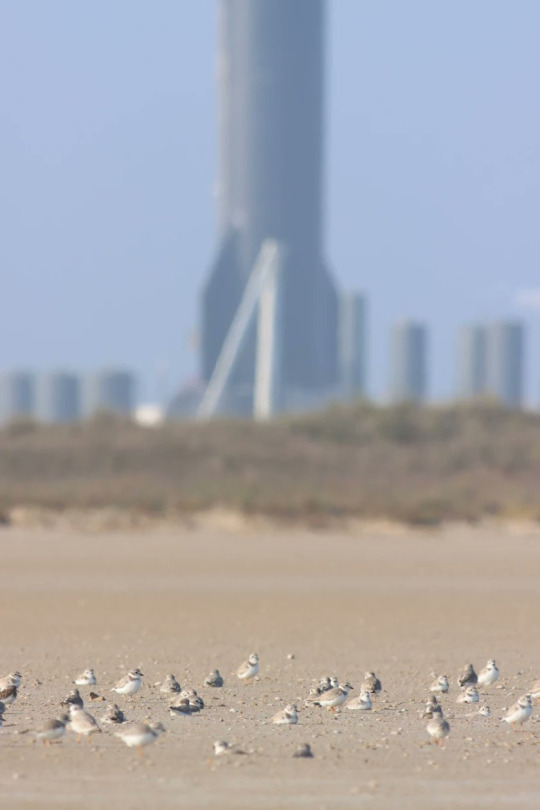
But you know, privatising space is cool because billionare fanboys think it's awesome.
#spaceX#environmental impact#environmentalism#protected species#endangered species#piping plovers#capitalism will kill us all#but its starting with the birds#NASA has oversight and regulations for a reason actually#Put scientists in charge of space not business
5K notes
·
View notes
